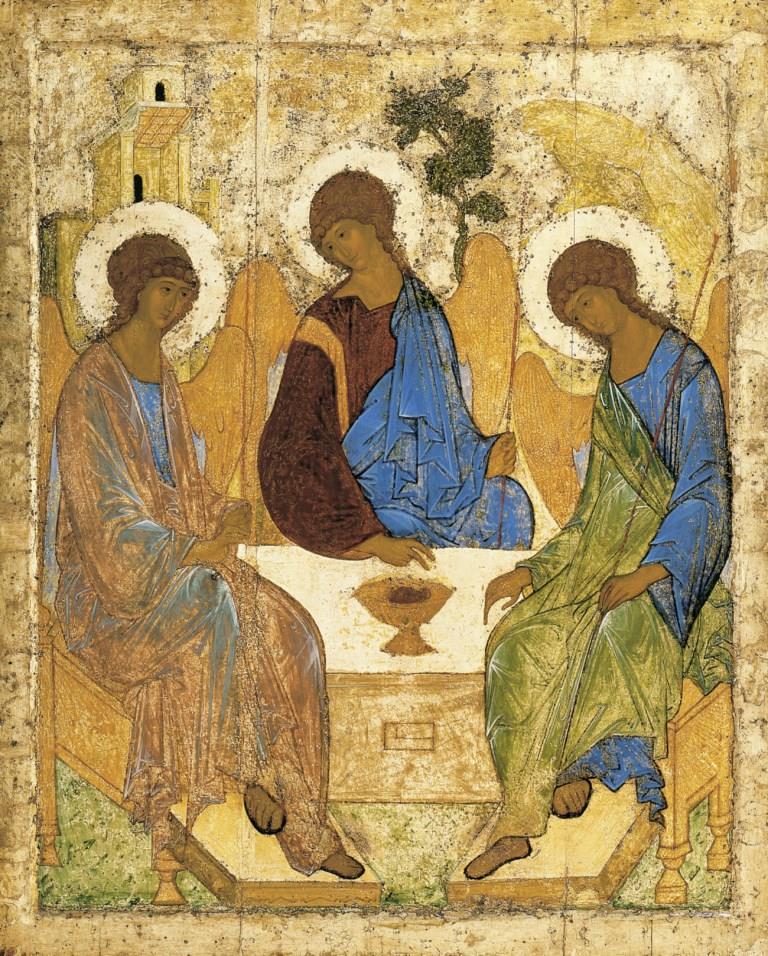Scripture readings: Isa. 6:1-8; Ps. 29; Rom. 8:12-17; John 3:1-17 Sermon by Sheila Graham (from Ps. 29:4-8; Isa. 6:1-5; John 3:11-17; Rom. 8:14-17)
The Triune God of Love & Power
Introduction
A friend of mine decided to read the entire Bible. As she started through the Old Testament, her first impression was that the God of the Old Testament was scary and harsh. It seemed to her that he would make promises and then change his mind. She was referring to the Israelites, including Moses, who were denied entrance into the Promised Land after all those miserable years wandering in the desert. She also noted that God got angry at times and would kill off a lot of people. She felt Jesus was the loving God, but that the God of the Old Testament was scary.
C.S. Lewis gives a more nuanced portrayal of Jesus in several of his books, presenting him as a great lion named Aslan who is both scary and loving:
“Aslan is a lion—the Lion, the great Lion.” “Ooh,” said Susan. “I’d thought he was a man. Is he quite safe? I shall feel rather nervous about meeting a lion…” “Safe?” said Mr. Beaver… “Who said anything about safe? ‘Course he isn’t safe. But he’s good. He’s the King, I tell you.” (The Lion, the Witch, and the Wardrobe)

Can the triune God—the God who is Father, Son and the Holy Spirit—be both scary and a God of love? Can we trust a God like that? Well, God assures us throughout his Word that he is love, and we also find there that God is powerful—note Psalm 29:
The voice of the LORD is powerful; the voice of the LORD is full of majesty. The voice of the LORD breaks the cedars; the LORD breaks the cedars of Lebanon. He makes Lebanon skip like a calf, and Sirion like a young wild ox. The voice of the LORD flashes forth flames of fire. The voice of the LORD shakes the wilderness; the LORD shakes the wilderness of Kadesh. (Ps. 29:4-8)
God is powerful and almighty—a mover and a shaker. All he has to do is speak and things happen. The psalmist didn’t see God as wimpy. Let’s see another example in the book of Isaiah:
In the year that King Uzziah died, I saw the Lord sitting on a throne, high and lofty; and the hem of his robe filled the temple. Seraphs were in attendance above him; each had six wings: with two they covered their faces, and with two they covered their feet, and with two they flew. And one called to another and said: “Holy, holy, holy is the LORD of hosts; the whole earth is full of his glory.” (Isa. 6:1-3)
Here, in Isaiah’s vision, God is attended and worshiped by splendid heavenly, spiritual creatures (some might say weird looking ones). It is obvious that God is worthy of great honor, even from spiritual beings. What was Isaiah’s reaction to what he saw?
The pivots on the thresholds shook at the voices of those who called, and the house filled with smoke. And I said: “Woe is me! I am lost, for I am a man of unclean lips, and I live among a people of unclean lips; yet my eyes have seen the King, the LORD of hosts!” (Isa. 6:4-5)
Isaiah was scared at what he saw—so scared he thought he might die on the spot. We can argue that God doesn’t really sit on a throne wearing an overflowing robe. No one has actually seen God—what Isaiah saw was a vision. But this vision was how God revealed himself to Isaiah at that time and in that cultural setting. God deals with people where they are.
When questions about God come up, we don’t need to try to apologize for God. He doesn’t need our help. We certainly can’t explain everything God did or still does. He is God, after all, and we’re not. But one thing we do know, because God tells us—God is love. That’s who he is and who he has always been.
When we read the Bible, we need to look at the historical and cultural context it was written in. It’s obvious in the Old Testament that God dealt with people in the culture they lived in at the time. The writers of the Hebrew Scriptures were people of that culture as well. They viewed the world through the lens of that time and place.
Throughout the Old Testament, we learn some basic truths about who God is. God is not only the almighty powerful Creator of all that is, he is a God of love—a God of redemption and salvation who is extremely patient. How many times did he save Israel, for example, before they finally were scattered among the other nations? He was even patient with Egypt, waiting 400 years before he lowered the boom, so to speak.

(public domain via Wikimedia Commons)
Now, when my friend gets to the New Testament, she will learn something surprising: “In the beginning was the Word, and the Word was with God, and the Word was God” (John 1:1). Jesus is that same God we’ve just been describing! Jesus said he came to reveal the Father and to send the Spirit. Along with redeeming and saving us, restoring our relationship with the Father was a primary purpose of his ministry. He wasn’t a vision; Jesus was a real human being. And, not only that, as he told Nicodemus, he had been in heaven with God.
Nicodemus was a Pharisee who sought out Jesus because he saw Jesus’ miracles and believed Jesus was from God. In Jesus’ explanation of spiritual rebirth, he referred back to the incident in the Old Testament when God saved the Israelites from poisonous serpents. This was something Nicodemus could understand from his knowledge of the Hebrew Scriptures. Using this analogy, Jesus taught Nicodemus about God’s plan to redeem and save the entire world:
Very truly, I tell you, we speak of what we know and testify to what we have seen; yet you do not receive our testimony. If I have told you about earthly things and you do not believe, how can you believe if I tell you about heavenly things? No one has ascended into heaven except the one who descended from heaven, the Son of Man. And just as Moses lifted up the serpent in the wilderness, so must the Son of Man be lifted up, that whoever believes in him may have eternal life. For God so loved the world that he gave his only Son, so that everyone who believes in him may not perish but may have eternal life. Indeed, God did not send the Son into the world to condemn the world, but in order that the world might be saved through him. (John 3:11-17)
Holy Scripture, both the Old and New Testaments, show us that our triune God whom we celebrate today on Trinity Sunday, is a God of redemption and salvation. He is an extremely patient God, and we can be happy and relieved that he is.
Aren’t there times in all our lives when we’re glad God didn’t give us what we deserved, right on the spot? If God were like that, our earth would be desolate, for we have all sinned.
Yes, our God is powerful and almighty—Jesus could get angry. Jesus is God and some things really set him off: hypocrisy, false teaching and defilement of his Father’s house. Yes, God is love, but, the Bible declares that God judges sin. Why? Because sin is the barrier between God and humanity, and Jesus dies to remove that barrier. God resists sin—he is adamantly and eternally opposed to evil and the resulting painful consequences for humanity. Why? Because God loves humanity.
God, in Christ, has judged all sin, and a day of judgment is coming when all sin and evil will be eradicated. But thanks be to God, the righteous and merciful God-man Jesus Christ is humanity’s judge, our advocate and our redeemer. Jesus came to restore a relationship between God and humanity that had gone very wrong.
In the Old Testament we see very few people who had any kind of a relationship with God. Noah, Abraham, Moses, the prophets and a few of Israel’s kings, are some examples. Christ came to rectify that. He came so all could have a loving relationship with the Father, in and through him, by the Holy Spirit.
Conclusion
As we conclude, let’s ask again, can this very powerful, perfect, sinless God be trusted? We look at ourselves and all our imperfections and sometimes we wonder—how can God love us? Well, he can, and he does. Note what the apostle Paul wrote:
For all who are led by the Spirit of God are children of God. For you did not receive a spirit of slavery to fall back into fear, but you have received a spirit of adoption. When we cry, “Abba! Father!” it is that very Spirit bearing witness with our spirit that we are children of God, and if children, then heirs, heirs of God and joint heirs with Christ—if, in fact, we suffer with him so that we may also be glorified with him. (Rom. 8:14-17)
Yes, the almighty, powerful God is a God of love, and he can be trusted. We don’t have to live in fear of God, for our Savior Jesus has come to our rescue and by the Spirit has freed us from our burdens of sin, shame and guilt so that we, as his children, can call God our Father—our Abba.
God, who is Father, Son and Spirit—the Holy Trinity—is a God of love; a God of salvation. Think about it! We are in a family relationship with the all-powerful Creator God of the universe! That’s what Jesus’ sacrifice is all about; that’s what the Spirit’s ministry is all about. That’s what the heart of the Father is all about. Thank God the Father, God the Son and God the Holy Spirit for their love and mercy! Amen!



Please note that comments are moderated. Your comment will not appear until it is reviewed.